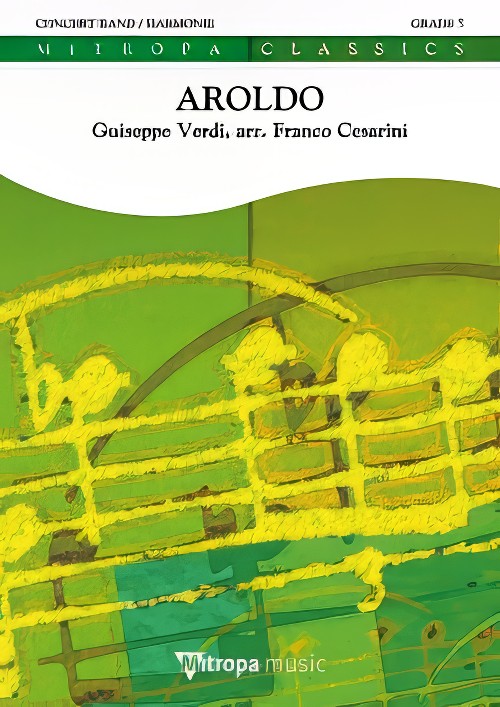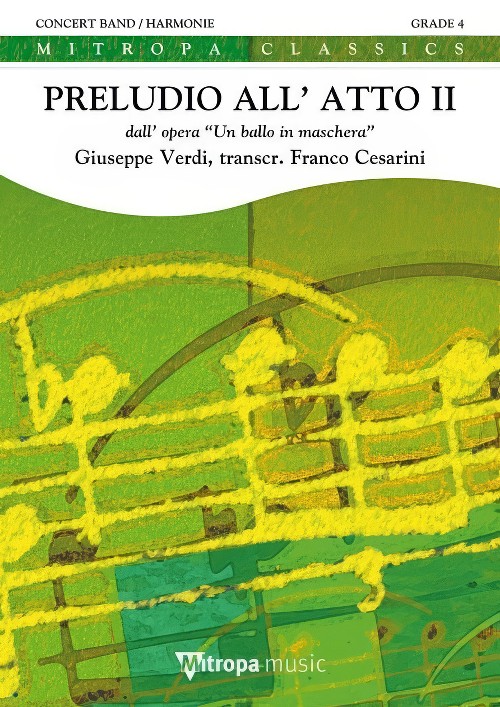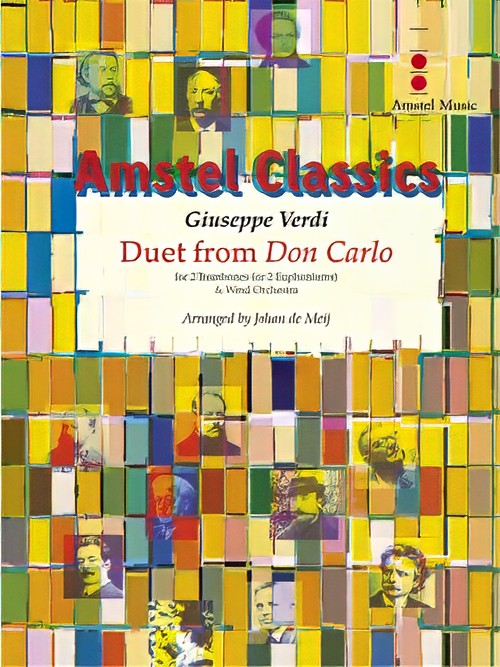Results
-
 £92.00
£92.00Verdi Goes Latin La Traviata - Giuseppe Verdi
Estimated dispatch 7-14 working days
-
 £264.00
£264.00Viva Verdi (+ Male Chorus) - Giuseppe Verdi
Estimated dispatch 7-14 working days
-
£73.00
Verdi - Giuseppe Verdi
Estimated dispatch 7-14 working days
-
£102.70
Sempre Verdi - Giuseppe Verdi
Estimated dispatch 7-14 working days
-
£76.99
The Young Verdi - Giuseppe Verdi
Estimated dispatch 7-14 working days
-
 £139.99
£139.99Aroldo (Concert Band - Score and Parts) - Verdi, Giuseppe - Cesarini, Franco
Aroldo, number 22 of the 32 operas written by Verdi, is certainly not one of the best-known works from "the genius of Busseto." Written in 1857, it is in fact a remake of the 1848 opera Stiffelio, which told a story of adultery and which was censored for its "indecent" content. Verdi found the censorship of Stiffelio unacceptable, and with a performance in Verona approaching at the start of 1851, he wrote to his editor, Ricordi: "If my libretto is censored, it will not be possible to obtain the effect I desire, so I would rather wait until I can rewrite the last scene." But the modifications to Stiffelio did not stop there. The setting, the historical period and the finale were also completely changed. In the process of converting Stiffelio to Aroldo, Verdi no doubt succeeded in strengthening certain moments. However, the fame of the three operas he had written in the meantime - Rigoletto, Il Trovatore and La Traviata - did not allow Aroldo to receive the recognition it deserved. The opera's symphony is indeed a superb work and contains moments of outstanding lyricism. The trumpet solo in the introduction is the longest written by Verdi for this instrument.Duration: 8:45
Estimated dispatch 7-14 working days
-
 £89.99
£89.99Preludio All' Atto II (Concert Band - Score and Parts) - Verdi, Giuseppe - Cesarini, Franco
For the first draft of the libretto of Un ballo in maschera (1859), Giuseppe Verdi drew his inspiration from the grand-opra Gustave III by Auber, an opera performed for the first time in Paris in 1833 that depicted the assassination of the King of Sweden. However, censorship, first in Naples and then in Rome, intervened and imposed heavy modifications. Perhaps because it was too demanding, Verdi showed no intransigence with the requests coming from Naples and refused to alter the libretto. On the other hand, he yielded to the requests of the Roman authorities and agreed to change the site of the action and the identity of the protagonists. Consequently, the scene moved from Stockholm to Boston and King Gustav became the Count of Warwick, Governor of Massachusetts.The prelude to the second act is very short and introduces the scene at the place where the scaffold stands. In only a few measures, Verdi skilfully succeeds in condensing the interior restlessness of the protagonists, alongside a prayer of hope.Duration: 2:15
Estimated dispatch 7-14 working days
-
 £89.99
£89.99Preludio all' atto I - Giuseppe Verdi
Ernani (1844), Giuseppe Verdi's fifth opera, is based on the homonymous tragedy by Victor Hugo. Verdi's success with Ernani, as well as Nabucco and I lombardi alla prima crociata, can be ascribed to two distinct ideas: the melodic idea and the patriotic idea. The melodic idea is very important to move and touch the audience, while the patriotic idea is the source of enthusiasm and emotions. Approximately ten years elapse between two similar stories: the one of the outlaw Ernani and the one of Manrico, the troubadour. In the prelude to Act I, in only three minutes, Verdi has succeeded in skillfully concentrating the main elements of the entiredrama. One can clearly observe the themes of love, oath, and death.
Estimated dispatch 7-14 working days
-
 £89.99
£89.99Preludio all' atto II - Giuseppe Verdi
For the first draft of the libretto of Un ballo in maschera (1859), Giuseppe Verdi drew his inspiration from the grand-opra Gustave III by Auber, an opera performed for the first time in Paris in 1833 that depicted the assassination of the King of Sweden. However, censorship, first in Naples and then in Rome, intervened and imposed heavy modifications. Perhaps because it was too demanding, Verdi showed no intransigence with the requests coming from Naples and refused to alter the libretto. On the other hand, he yielded to the requests of the Roman authorities and agreed to change the site of the action and the identity of the protagonists. Consequently, the scene movedfrom Stockholm to Boston and King Gustav became the Count of Warwick, Governor of Massachusetts.The prelude to the second act is very short and introduces the scene at the place where the scaffold stands. In only a few measures, Verdi skillfully succeeds in condensing the interior restlessness of the protagonists, alongside a prayer of hope.
Estimated dispatch 7-14 working days
-
 £115.00
£115.00Duet from Don Carlo (Trombone or Euphonium Duet with Concert Band - Score and Parts) - Verdi, Giuseppe - De Meij, Johan
Don Carlo was originally written (title Don Carlos) as a French five-actor for the 1867 world exhibition in Paris. Later, Verdi transformed this improant grand opera into a four-acter in Italian. With its many leitmotifs, Don Carlo was 'too Wagnerian' according to French critics, although Verdi hardly knew the music by his German colleage. For the record, the composer was not happy either with the 'lifeless and cold' performance in Paris, and the drama, concerning Charles V, Philip II and crown price Don Carlo, found its way to La Scala only twenty years later. This duet, arranged by Johan de Meij, originates from the second act. While monks pray for the soul of Emperor Charles V, his grandson Don Carlo takes the stage, tormented by the fact that the woman he loves is now married to his father. Carlo's friend Rodrigo, the Margquis of Posa, has just returned from Flanders. He asks crown prince Carlo to help him ease the oppression and suffering of the Flemish people. Carlo reveals his secret: he is in love with his stepmother. Rodrigo advises him to leave Spain and to go to Flanders. The two men vow to be friends forever in the duet Dio, che nell' alma infondere (God, who wishes to instil love and hope in our souls). Duration: 4.00
Estimated dispatch 7-14 working days
